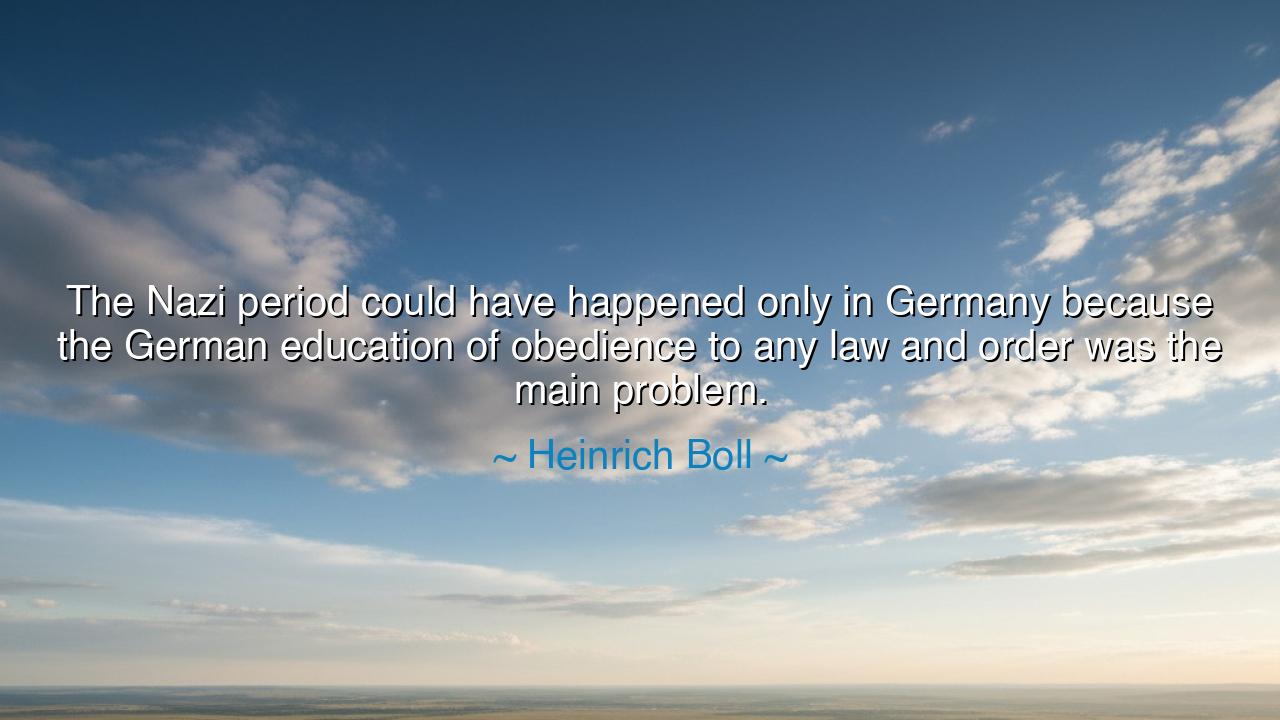
The Nazi period could have happened only in Germany because the
The Nazi period could have happened only in Germany because the German education of obedience to any law and order was the main problem.






Heinrich Böll, the German writer and conscience of a wounded nation, once declared with painful clarity: “The Nazi period could have happened only in Germany because the German education of obedience to any law and order was the main problem.” These words pierce like a sword, for they do not blame only the tyrants, but also the soil in which tyranny grew. He warns us that blind obedience, even when clothed in the garments of discipline and order, can become the seed of catastrophe.
The meaning of this wisdom is severe and sobering. In Germany, for generations, children were taught to revere authority above all else, to submit without question to the commands of teachers, rulers, and institutions. This training in submission seemed virtuous—it promised unity, efficiency, and order. But when the shadow of Hitler rose, that very virtue became a curse. A people drilled to obey without question were unable to resist even when the commands of their leaders led to unspeakable cruelty. Thus, Böll reminds us that education must never teach obedience without conscience, for when it does, it prepares the ground for tyranny.
The origin of his words is found in his own life. Heinrich Böll was a young man during the Third Reich, drafted into the German army, witnessing firsthand the madness of blind submission. After the war, as a writer, he became a moral voice, refusing to let his people forget how their culture of obedience had betrayed them. He knew that the tragedy of the Nazi era was not only the evil of its leaders but also the silence and compliance of millions who had been trained never to resist, never to ask, never to say no.
History itself confirms this truth. In the Nuremberg trials, many Nazi officers defended themselves by saying, “I was only following orders.” They believed their obedience absolved them of responsibility. Yet the world judged otherwise: obedience to law and order is no excuse when the law itself is unjust, when the order itself is evil. The tribunal declared that every human being has a higher duty—to conscience, to justice, to truth. Here the world learned, through blood and sorrow, the lesson Böll later spoke: that obedience without moral judgment is not virtue, but danger.
Consider the contrast with other times and places. When Martin Luther King Jr. led the civil rights movement in America, he taught that unjust laws must not be obeyed. In his “Letter from Birmingham Jail,” he wrote that one has a moral duty to disobey laws that degrade human dignity. His movement succeeded not through blind obedience, but through courageous resistance. Where Germany had trained its people to yield, King trained his people to stand. In this contrast lies the very heart of Böll’s warning.
The lesson for us is urgent and timeless. Education must never be only about discipline and obedience; it must also cultivate conscience, courage, and the strength to resist injustice. A society that teaches its children to follow every rule without question is building a prison for its future. But a society that teaches its children to weigh laws against justice, to test authority against truth, to place conscience above command—this society arms itself against tyranny.
So what must you do? If you are a parent, teach your children not only to respect order, but to ask why. If you are a teacher, nurture not only discipline but also moral reasoning. If you are a citizen, remember that your highest loyalty is not to authority but to justice, not to rulers but to truth. Obedience has its place, but never let it blind you to the higher law of humanity.
Thus remember Böll’s words: “The Nazi period could have happened only in Germany because the German education of obedience to any law and order was the main problem.” Let them stand as a warning across the ages. For the world does not need citizens who obey without thought; it needs citizens who see clearly, who judge rightly, and who have the courage to resist when the law commands what conscience forbids. In this lies the true safeguard of freedom, and the true purpose of education.






AAdministratorAdministrator
Welcome, honored guests. Please leave a comment, we will respond soon